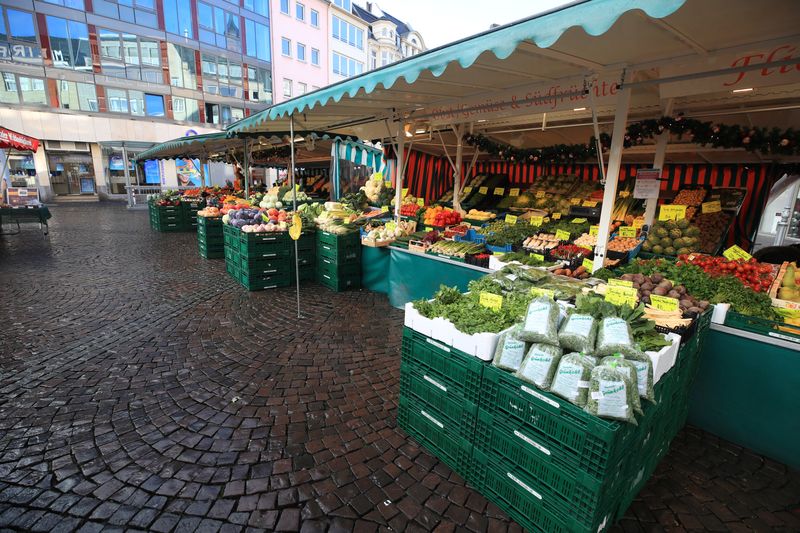By Maria Martinez
BERLIN (Reuters) -Germany on Wednesday joined a list of major euro zone economies reporting a bigger than expected drop in inflation, suggesting that price growth may be falling more quickly than expected, adding to arguments for caution on rate hikes.
The European Central Bank has raised rates by a record 375 basis points in the past year and already flagged another move in June. But policy “doves,” particularly from the euro zone’s southern rim, have called for a more tempered approach as the increases are still working their way through the economy.
In Germany, inflation eased this month to its lowest level in more than a year, official data showed on Wednesday, after similarly benign readings across the euro zone, suggesting that price growth may be falling more quickly than expected in the 20-nation currency bloc.
Headline inflation in France, Italy and Spain also fell sharply in May, which, taken together with Germany, points to a drop in euro zone headline inflation in May, supporting arguments for ECB caution on rate hikes.
Euro zone inflation data is due on Thursday. Economists polled by Reuters expect inflation to fall to 6.3% in May from 7.0% in April.
"Clearly the decline has been bigger than what was discounted by analysts and I think that is positive news," ECB vice president Luis de Guindos said on Wednesday.
German consumer prices, harmonised to compare with other European Union countries, rose by a less-than-anticipated 6.3% on the year in May, federal statistics office preliminary data showed.
Analysts had expected the harmonised reading to increase by 6.8% on an annual basis. This is the lowest print since March 2022, in the aftermath of Russia's Ukraine invasion.
In Germany, for the first time this year, prices actually dropped compared with the previous month. Consumer prices in harmonised terms fell 0.2% on the month.
"This marks the next stage of a gradually broadening disinflationary process as the drop in headline inflation is no longer exclusively the result of base effects but also the result of dropping prices," ING's global head of macro Carsten Brzeski said.
Food prices in Germany rose 14.9% year-on-year, slowing from the 17.2% rise in April. Energy prices registered a below-average increase of 2.6%, also down from 6.8% in the previous month.
Germany's services inflation also edged down, with prices rising by 4.5% in May, after they increased 4.7% in April. This is due to a new subsidised travel ticket, covering all local public transport for 49 euros ($54) per month.
Policymakers in the southern euro zone are advocating caution on rate increases, but the chiefs of the German and Dutch central banks, among others, have made the case for a rate hike in July. But few, if any of them, are willing to discuss policy beyond that, saying that inflation developments, particularly for core prices, will be key.
German Finance Minister Christian Lindner said the latest inflation data for Europe's biggest economy was a step in the right direction but it was not yet time to sound the all-clear.
"To make sure this trend is not undermined, the European Central Bank's interest rate policy and state fiscal policy must continue to work (restrictively) hand in hand, Lindner tweeted on Wednesday
Franziska Palmas, senior Europe economist at Capital Economics, said the national figures also suggested that euro zone core inflation probably fell, mainly thanks to a decline in goods inflation.

"As long as the gradual easing in core inflation continues, the ECB will settle for two more hikes, bringing the deposit rate to a peak of 3.75%," Palmas said.
($1 = 0.9084 euros)